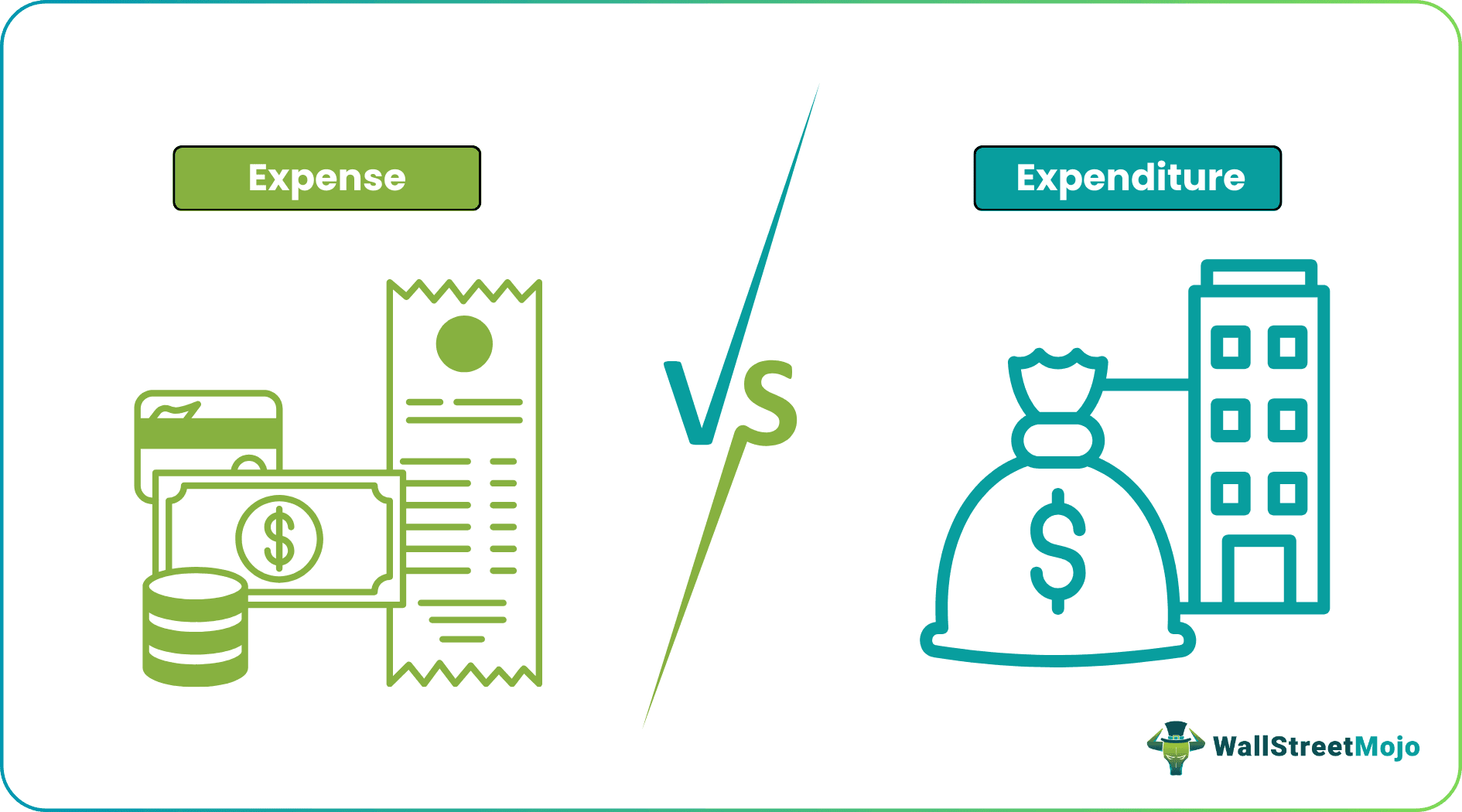Table Of Contents
Difference Between Expense vs Expenditure
Expense vs. Expenditure - In simple words, expenses are the costs incurred to earn revenues. At the same time, expenditure is the cost spent on purchasing or growing fixed assets.

In this article, we look at Expense vs. Expenditure in detail.
Table of contents
What is the Expense?
- An expense is a cost that is paid or given in exchange for something of value. That something can be produced or services. When this product or service costs a great deal, it is expensive, and it becomes inexpensive when something does not cost a great deal. In the world of accounting, the word expense has a particular meaning.
- We can define expense as a cash remittance from an individual or an organization to another individual or organization. In other words, an expense is a situation in which an existing asset is utilized for payment or liability happens. If we see this from the point of view of the accounting equation, expenses decrease the owner's assets.
- International Accounting Standards Board defines expenses as the gradual reduction in economic benefits during the accounting period in the form of remittances or outward cash flows or exhaustion in the number of assets or sustains liabilities that end up in reducing the owner's equity. So we can sum up expenses as outflows or using up of assets as part of operations of a business to generate sales/revenue.
What is Expenditure?
- On the other hand, expenditure can be defined as the amount spent for the long-term on an asset, which gives a long-term benefit like building, furniture, plant, etc
- In the case of expenditure, the benefits are achieved over the long-term period, which is usually more than one year. The use of term expenditure relates to the purchase of fixed assets.
- There are two types of expenditure in accounting books: Capex definition and Revenue expenditure. Capital expenditure is the one that is done to purchase or increase the value of fixed assets.
- Revenue expenditure is the expenditure whose benefit will be received after the whole accounting year. Revenue expenditures include the cost of goods sold or repairs and maintenance expenses. For example, purchasing buildings, land, and plants are capital expenditure.
Expense vs. Expenditure Infographics
Here are the top 7 differences between Expense vs. Expenditure

Expense vs. Expenditure Key Differences
The critical differences between Expense vs. Expenditure are as follows -
- While both these terms are used in accounting to refer to the costs done by the organization, they are different. Expenses are those costs that incur to earn revenues. In contrast, expenditures are those costs that incur to purchase or increase the value of the organization's fixed assets.
- Expenses incur for a short-term basis, and expenditures incur for a long-term period.
- Expenses affect the financial statements of the company. Latter records them as the costs incurred to earn revenues. Financial statements don't record expenditures. Expenditures generally don't affect the financial statements of the company.
- Expenses are done by a company so that it can function properly daily. In comparison, expenditure is done by a company to establish itself to start proper operations.
- Expenses are generally anticipated by the company and take place multiple times. At the same time, expenditures are not so much anticipated costs and generally occurs once in the period.
- Examples of expenses are salary paid, rent, etc. Examples of expenditures are payments made to purchase new land or buildings for business, equipment, etc.
Expense vs. Expenditure Head to Head Differences
Now, let's have a look at the head to head differences between Expense vs. Expenditure.
| Basis | Expense | Expenditure |
|---|---|---|
| Meaning of the terms | Expenses are those costs that incur to earn revenues. | Expenditure is the cost that is spent on the purchase or growth of fixed assets. |
| Effect on Financial Statement | Expense affects a company's Profit and Loss statement as they appear as costs incurred to earn revenue. | Expenditure does not have any implication on the financial statements and is not usually recorded. |
| Term | An expense is generally for short-term costs of the organization. | Expenditure is usually the long-term costs of the organization. |
| A number of times suffered. | An expense incurs multiple times. | Expenditure is incurred once in a period. |
| Purpose of spending | An expense is done for general expenses. An organization's expenses are done so that it can run daily. | Expenditure is done for Capital and Revenue expenditure. An organization does expenditures to establish it so that it can operate. |
| Examples | Salary paid, rent paid, wages, etc. are expenses. | Purchase of new land, purchase of new plants for business, etc. are examples. |
| Expectation | Expenses are high and very frequently expected. | Expenditures are not expected in that frequent manner. |
Conclusion
Both the terms expense and expenditure, though used widely in the accounting concepts, differ. Expense refers to short-term costs incurred by the company. At the same time, expenditure refers to the long-term costs incurred by the company for its establishment and operations. Both the terms are valuable in the accounting equation since both have specific contributions and meanings. In comparison, expenses directly affect a company's profit and loss statement and are recorded as the costs incurred to generate revenues. Expenditures do not directly affect the company's financial statements and are not recorded.
Recommended Articles
This article has been a guide to Expense vs. Expenditure. Here we discuss the top 9 differences between Expenses and Expenditure along with infographics and a comparison table. You may also have a look at the following articles –

